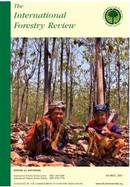News

The International Institute for Sustainable Development publishes a guest editorial from Tiina Vahanen, FAO's Deputy Director, Forest Policy and Resources Division, on the growing momentum and success of the REDD+ programme. The programme is maturing as countries build the necessary systems to reap the results-based rewards of participation. But, much work and fresh challenges lie ahead as countries move from readiness to implementation.

Deforestation is complex and has many underlying causes; therefore, it is important to understand any recurring patterns and correlations that can help countries to tailor their efforts towards reducing the loss of forests and its associated carbon emission. With the goal to identify such patterns and use them to manage the world’s forests sustainably in the future, a new study “Global deforestation patterns: comparing recent and past forest loss processes through a spatially explicit analysis” by Marieke Sandker, Yelena Finegold, Remi d'Annunzio, and Erik Lindquist was recently published by International Forestry Review.
The study compares several global FAO products to assess drivers of...

FAO initiated collaboration between Forest Survey of India (FSI) and Sri Lanka Forest Department (SLFD) for the design of Sri Lanka’s National Forest Inventory (NFI), institutional capacity building and technology transfer for implementing Sri Lanka’s first NFI cycle. Cooperation between India and Sri Lanka was initiated in early January 2015, with the visit of a team of senior officers of SLFD to FSI for orientation and training on India’s NFI design and implementation, and discussion on potential application in Sri Lanka. SLFD subsequently invited FSI to continue this training and technical support, in partnership with FAO, through the Sri Lanka...

An expert exchange took place at Victoria Falls in Zimbabwe with the participation of 190 specialists to work on the draft of the update to the guidelines that countries use to estimate greenhouse gas emissions and removals in order, among others, to bring them in line with the new requirements of the Paris Agreement.
This is the second meeting of lead authors of the 2019 Refinement to the 2006 IPCC Guidelines for National Greenhouse Gas Inventories, in short 2019 Refinement.
Read more about the expert meeting and the next steps in the press release and at the website of IPCC (www.ipcc.ch)
For more information, please contact Inge Jonckheere,...
Big Data for forest biodiversity
10/10/2017
10/10/2017

The biological diversity of the world’s forests is becoming increasingly relevant as countries meet reporting obligations of national institutions and international conventions. While contributing to accelerating extinction rates, forest loss also adds up to the uncertainties associated with climate change. FAO Forestry and through the UN-REDD Programme, FAO supports countries to monitor their forest resources as these are the most important repositories of terrestrial biological diversity. In the present era of Big Data, cooperation among countries, agencies and institutions is crucial for sustaining global forest biodiversity.
Working not only with governments, but also with the academic community, FAO actively contributes towards...

